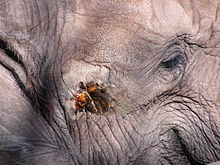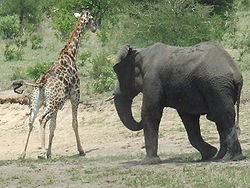- Musth
-
- Distinguish from must.
Musth or must (
 /ˈmʌst/) is a periodic condition in bull elephants, characterized by highly aggressive behavior, accompanied by a large rise in reproductive hormones - testosterone levels in an elephant in musth can be as much as 60 times greater than in the same elephant at other times. However, whether this hormonal surge is the sole cause of musth, or merely a contributing factor, is unknown; scientific investigation of musth is problematic because during musth even elephants that are otherwise placid may try to kill humans.
/ˈmʌst/) is a periodic condition in bull elephants, characterized by highly aggressive behavior, accompanied by a large rise in reproductive hormones - testosterone levels in an elephant in musth can be as much as 60 times greater than in the same elephant at other times. However, whether this hormonal surge is the sole cause of musth, or merely a contributing factor, is unknown; scientific investigation of musth is problematic because during musth even elephants that are otherwise placid may try to kill humans.Contents
Cause and effects
Although it has often been speculated by zoo visitors[1] that musth is linked to rut, it is unlikely there is a biological connection because the female elephant's estrus cycle is not seasonally-linked, whereas musth most often takes place in winter. Furthermore, bulls in musth have often been known to attack female elephants, regardless of whether or not the females are in heat. There has been speculation that there may be a connection between musth and dominance behaviour.
Often, elephants in musth discharge a thick tar-like secretion called temporin from the temporal ducts on the sides of the head. Temporin contains proteins, lipids (notably cholesterol), phenols, cresols and sesquiterpenes (notably farnesol and its derivatives).[2] Secretions and urine collected from zoo elephants have been shown to contain elevated levels of various highly odorous ketones and aldehydes. The elephant's aggression may be partially caused by a reaction to the temporin, which naturally trickles down into the elephant's mouth. Another contributing factor may be the accompanying swelling of the temporal glands; this presses on the elephant's eyes and causes acute pain comparable to severe root abscess toothache. Elephants sometimes try to counteract this pain by digging their tusks into the ground.
Musth is linked to sexual arousal or establishing dominance, but this relationship is far from clear. Cases of elephants goring and killing rhinoceroses in national parks in Africa have been documented and attributed to musth in young male elephants, especially those growing in the absence of older males. Studies show that reintroducing older males into the elephant population of the area seems to prevent younger males from entering musth, and therefore, stop this aggressive behavior.[3][4]
In domesticated elephants
A musth elephant, wild or domesticated, is extremely dangerous to humans. In zoos, musth has been the cause of incidents in which elephant keepers have been killed. Zoos keeping adult male elephants need extremely secure enclosures, which greatly complicates the attempts to breed elephants in zoos.
Domesticated elephants on musth in India are traditionally tied to a strong tree, or two strong trees, and denied food and water, or put on a starvation diet, for several days, after which the musth passes. Mahouts are often able to greatly shorten the duration of their elephants' musth, typically to five to eight days; xylazine is also used.
Another method is to chain the elephant separately for nearly a month and give it special medicinal food. During this time, the elephant is not used for work or religious processions.
As mahouts work with Indian elephants, the starvation technique has not been tried on African elephants.
Etymology
The word is derived from Persian مست (mast, pronounced [mæst] in modern Farsi), which means "intoxicated" though in modern usage, refers to a state of enjoyment, fun, pleasure or gratification—of any kind, experienced by humans or other creatures. In popular culture, the word is encountered frequently, in popular song lyrics, in the titles of Indian TV shows and in the titles of Bollywood movies, such as Masti (2004), and the Kannada movie Masti (2007).
References in popular culture
Shooting an Elephant is a possibly autobiographical account by George Orwell in which he describes how an elephant in Burma had an attack of musth and went on to kill an Indian, leading him to shoot it.
References
- ^ http://www.upali.ch/musth_en.html
- ^ Sukumar, R (2003). The living elephants: evolutionary ecology, behavior, and conservation. USA: Oxford University Press. p. 155. ISBN 0195107780, 9780195107784. http://books.google.ca/books?id=P_IS80OBWTgC&pg=PA155&lpg=PA155&dq=temporin+elephant#v=onepage&q=temporin%20elephant&f=false. Retrieved 2010-12-25.
- ^ "Killing of black and white rhinoceroses by African elephants in Hluhluwe-Umfolozi Park, South Africa" by Rob Slotow, Dave Balfour, and Owen Howison. Pachyderm 31 (July–December, 2001):14-20. Accessed 14 September 2007.
- ^ Siebert, Charles (2006-10-08). "An Elephant Crackup?". New York Times Magazine. http://www.nytimes.com/2006/10/08/magazine/08elephant.html?pagewanted=1&ei=5070&en=ccc63627f454863c&ex=1167282000. Retrieved 2007-06-16.
External links
Categories:- Elephants
Wikimedia Foundation. 2010.




